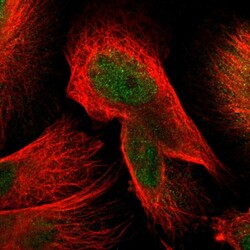Antibody data
- Antibody Data
- Antigen structure
- References [4]
- Comments [0]
- Validations
- Immunocytochemistry [1]
Submit
Validation data
Reference
Comment
Report error
- Product number
- HPA006531 - Provider product page

- Provider
- Atlas Antibodies
- Proper citation
- Atlas Antibodies Cat#HPA006531, RRID:AB_1854075
- Product name
- Anti-MPG
- Antibody type
- Polyclonal
- Description
- Polyclonal Antibody against Human MPG, Gene description: N-methylpurine-DNA glycosylase, Alternative Gene Names: MDG, Validated applications: WB, IHC, ICC, Uniprot ID: P29372, Storage: Store at +4°C for short term storage. Long time storage is recommended at -20°C.
- Reactivity
- Human
- Host
- Rabbit
- Conjugate
- Unconjugated
- Isotype
- IgG
- Vial size
- 100 µl
- Concentration
- 0.2 mg/ml
- Storage
- Store at +4°C for short term storage. Long time storage is recommended at -20°C.
- Handling
- The antibody solution should be gently mixed before use.
Submitted references A panel of colorimetric assays to measure enzymatic activity in the base excision DNA repair pathway
Base excision repair imbalance in colorectal cancer has prognostic value and modulates response to chemotherapy
Alkyladenine DNA glycosylase (AAG) localizes to mitochondria and interacts with mitochondrial single-stranded binding protein (mtSSB)
Poly (ADP-ribose) polymerase (PARP) is not involved in base excision repair but PARP inhibition traps a single-strand intermediate.
Healing E, Charlier C, Meira L, Elliott R
Nucleic Acids Research 2019;47(11):e61-e61
Nucleic Acids Research 2019;47(11):e61-e61
Base excision repair imbalance in colorectal cancer has prognostic value and modulates response to chemotherapy
Leguisamo N, Gloria H, Kalil A, Martins T, Azambuja D, Meira L, Saffi J
Oncotarget 2017;8(33):54199-54214
Oncotarget 2017;8(33):54199-54214
Alkyladenine DNA glycosylase (AAG) localizes to mitochondria and interacts with mitochondrial single-stranded binding protein (mtSSB)
van Loon B, Samson L
DNA Repair 2013;12(3):177-187
DNA Repair 2013;12(3):177-187
Poly (ADP-ribose) polymerase (PARP) is not involved in base excision repair but PARP inhibition traps a single-strand intermediate.
Ström CE, Johansson F, Uhlén M, Szigyarto CA, Erixon K, Helleday T
Nucleic acids research 2011 Apr;39(8):3166-75
Nucleic acids research 2011 Apr;39(8):3166-75
No comments: Submit comment
Supportive validation
- Submitted by
- Atlas Antibodies (provider)
- Main image

- Experimental details
- Immunofluorescent staining of human cell line U-251 MG shows localization to nucleoplasm & cytosol.
- Sample type
- Human
 Explore
Explore Validate
Validate Learn
Learn Western blot
Western blot Immunocytochemistry
Immunocytochemistry